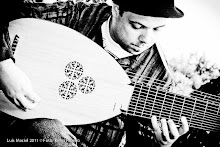 One of the reasons why Renaissance lute music is not very popular is its melancholic nature. The ultimate example of this is the music of the English composer John Dowland, born in 1563 and a contemporary of Shakespeare.
One of the reasons why Renaissance lute music is not very popular is its melancholic nature. The ultimate example of this is the music of the English composer John Dowland, born in 1563 and a contemporary of Shakespeare.However, faced with this apparent paradox, one might ask: If the Renaissance, with its revolutionary interest in the Arts and Sciences, took the place of the dark Middle Ages, how did melancholy appeared to establish itself as the dominant musical feeling of an age that was apparently of human discovery and enlightenment?
With the changes and revolutions of thought that have occurred in the Renaissance, specially in the Arts and Sciences, theological explanations which prevailed in the Middle Ages came to be discredited and less accepted, leading to experimental science as rational attempt to discover and understanding the world.
The cultural movement of the Renaissance brought a loss of references of the Medieval world, while making at the same time the genesis of the liberation of the individual through Reason, or the Protestant faith.
Melancholy appears in full in the field of Philosophy and the Arts. When the paradigms of faith, which gave Man all the answers, were broken through Protestant Reformation, brought about the exploration of the limits of human intellect in various dimensions.
The human perception of himself undergoes changes, leading him to realize that he was alone in the universe, that he was absolute master of his destiny and the only judge of his conduct. This burden was too oppressive for him to bear, inviting him to apathy, sadness and disbelief. Those melancholic feelings were grown as fashion by the musical elite of that time.
(Português)
Uma das razões porque a música renascentista de alaúde ainda não é muito popular é o seu carácter melancólico. O exemplo máximo dessa característica é a música do compositor inglês John Dowland, nascido em 1563 e contemporâneo de Shakespeare.
Porém, perante esse aparente paradoxo, pode-se perguntar: se o Renascimento, com o seu revolucionário interesse pelas Artes e pelas Ciências, tomou o lugar da sombria e obscura Idade Média, como é que a melancolia apareceu a impor-se como o sentimento musical dominante de uma época que, aparentemente, foi de luz e de descoberta para o ser humano?
Com as modificações e revoluções de pensamento ocorridas na Renascença, sobretudo nas Artes e nas Ciências, as explicações teológicas que imperavam na Idade Média passaram a ser desacreditadas e menos aceites, dando lugar à Ciência Experimental, como tentativa racional de descoberta e de compreensão do mundo.
O movimento cultural do Renascimento trouxe uma certa perda de referências do mundo medieval, fazendo simultaneamente a génese da libertação do indivíduo através da Razão, ou da Fé Protestante.
A melancolia aparece em pleno no campo da Filosofia e das Artes. Quando os paradigmas da fé, que davam ao Homem todas as respostas, foram quebrados através da Reforma Protestante, ocasionaram a exploração dos limites do intelecto humano em várias dimensões.
A percepção do Homem sobre si próprio sofreu mudanças, levando-o a tomar consciência de que estava só no Universo, que era senhor absoluto do seu destino e único juiz de sua conduta. Esse peso era demasiadamente opressor para que ele o carregasse, convidando-o à apatia, à tristeza e à descrença. Esses sentimentos melancólicos foram cultivados como moda pela elite musical renascentista.


